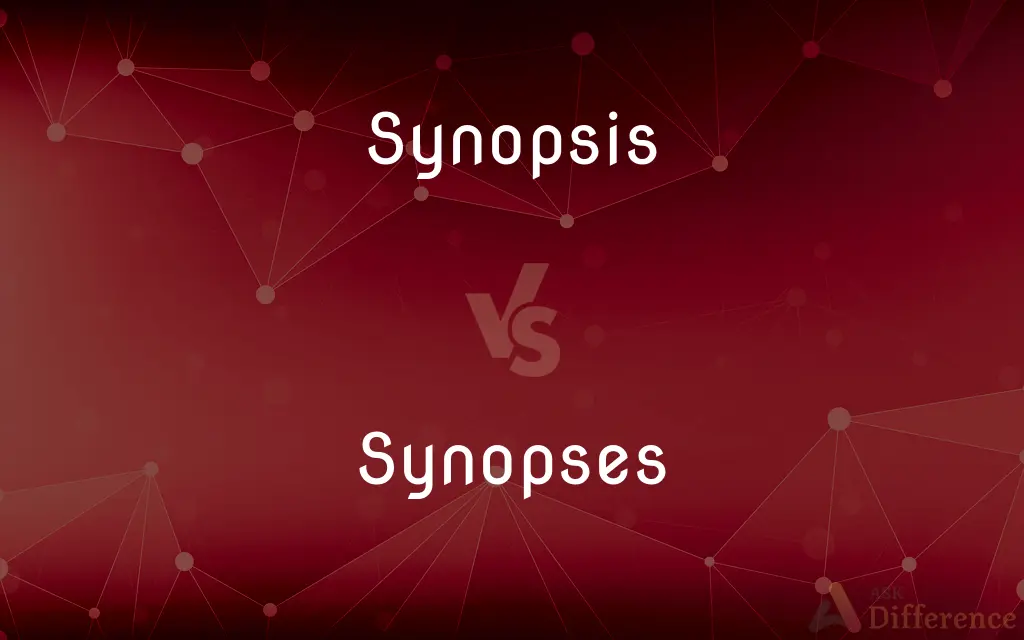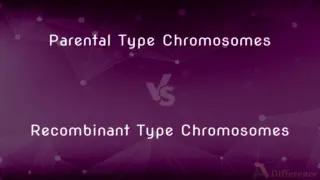Synopsis vs. Synopses — What's the Difference?
Edited by Tayyaba Rehman — By Fiza Rafique — Published on January 9, 2024
Synopsis is a brief summary of a larger work, while Synopses is the plural form, referring to summaries of multiple works.

Difference Between Synopsis and Synopses
Table of Contents
ADVERTISEMENT
Key Differences
The term Synopsis refers to a condensed statement or outline of a subject or a written work. A Synopsis is typically a singular term, summarizing one narrative or topic. On the other hand, Synopses is the plural form of synopsis, which implies multiple summaries of several works or subjects. Each presents essential points and summaries, but the number of works they refer to differs.
A Synopsis often serves as a succinct representation of a single piece of writing or presentation. It captures the main points in a condensed form. When one speaks of Synopses, they are referring to the summaries of more than one piece, each possibly varying in content and context but maintaining the quality of being succinct and direct in each separate summary.
In academic or professional settings, one might be asked to provide a Synopsis of their research or novel. In contrast, an editor or critic might review several Synopses to evaluate different pieces of literature. The function of both is to convey the essence of content, but a Synopsis does so for a single piece, while Synopses cover multiple pieces.
When writing, one might draft a Synopsis to clarify the central theme or plot of their work. Authors may also prepare multiple Synopses for a series of works they are presenting to a publisher. Though each synopsis within the Synopses should stand alone in summarizing an individual work, together they provide a broad overview of an author's publications or proposals.
To conclude, a Synopsis gives an overview and is written for a single document or presentation, whereas Synopses are multiple such summaries. The usage of Synopsis or Synopses depends entirely on whether one is summarizing a single work or multiple works, respectively.
ADVERTISEMENT
Comparison Chart
Number
Singular
Plural
Definition
Summary of a single work
Summaries of multiple works
Purpose
To outline the main points of one piece
To outline the main points of several pieces
Usage
Refers to one book, article, or document
Refers to multiple books, articles, documents
Example
A synopsis for a thesis
Synopses for a series of novels
Compare with Definitions
Synopsis
A brief for an executive review.
The committee requested a synopsis of the report.
Synopses
Abstracts for multiple articles.
She read through the synopses of recent journal publications.
Synopsis
A summary of the main points.
The book jacket featured a concise synopsis.
Synopses
Overviews for a range of topics.
The conference provided synopses for all the workshops.
Synopsis
A summary for a movie or play.
The film’s synopsis revealed the plot twist.
Synopses
Briefs for several proposals.
The board reviewed synopses for the upcoming projects.
Synopsis
An outline for study purposes.
She wrote a synopsis of the lecture notes.
Synopses
Summaries for a series of novels.
The author’s website includes synopses for all her books.
Synopsis
An abstract for a scholarly article.
Researchers often read the synopsis before the full article.
Synopses
Summaries for different chapters.
He compared the synopses of each chapter to outline the book.
Synopsis
A brief outline or general view, as of a subject or written work; an abstract or a summary.
Synopses
A brief outline or general view, as of a subject or written work; an abstract or a summary.
Synopsis
(authorship) A brief summary of the major points of a written work, either as prose or as a table; an abridgment or condensation of a work.
Synopsis
A reference work containing brief articles that taken together give an overview of an entire field.
Synopsis
(Orthodoxy) A prayer book for use by the laity of the church.
Synopsis
A general view, or a collection of heads or parts so arranged as to exhibit a general view of the whole; an abstract or summary of a discourse; a syllabus; a conspectus.
That the reader may see in one view the exactness of the method, as well as force of the argument, I shall here draw up a short synopsis of this epistle.
Synopsis
A sketchy summary of the main points of an argument or theory
Common Curiosities
What is a synopsis?
A synopsis is a brief summary or general overview of a text or subject.
How do you write a synopsis?
Write a synopsis by condensing the main idea and supporting points of a work into a shorter form.
Is there a standard format for a synopsis?
While there's no one-size-fits-all format, a synopsis typically follows the narrative arc of the work it is summarizing.
When would you use the word synopses?
Use synopses when referring to summaries of multiple works.
Who reads synopses?
Synopses are often read by editors, publishers, professors, or anyone needing to understand the gist quickly.
Are synopses only for fictional works?
No, synopses can summarize non-fiction, research, plays, movies, and more.
Can a synopsis contain quotes?
While uncommon, a synopsis can include short quotes if they are pivotal to understanding the work.
How long is a typical synopsis?
A synopsis can vary in length but is generally a concise summarization of the main points.
What should a synopsis include?
A synopsis should include the central theme, main points, and a summary of the content.
How detailed should synopses be?
Synopses should be detailed enough to convey the essence but brief enough to be considered a summary.
Should synopses be written in the same style as the original work?
Synopses should mimic the tone and style of the original work to a degree, but clarity and conciseness are most important.
Can a synopsis include opinions?
A synopsis is usually objective, focusing on facts rather than opinions.
Can synopses be used for comparison?
Yes, synopses can be used to compare the main points of different works.
What's the difference between a synopsis and an abstract?
A synopsis is generally more narrative and broader in scope, while an abstract is typically more concise and used for academic papers.
Do synopses reveal the ending of the story?
Synopses often reveal the complete narrative, including the ending, especially in professional settings.
Share Your Discovery

Previous Comparison
Parental Type Chromosomes vs. Recombinant Type Chromosomes
Next Comparison
Process in Java vs. Thread in JavaAuthor Spotlight
Written by
Fiza RafiqueFiza Rafique is a skilled content writer at AskDifference.com, where she meticulously refines and enhances written pieces. Drawing from her vast editorial expertise, Fiza ensures clarity, accuracy, and precision in every article. Passionate about language, she continually seeks to elevate the quality of content for readers worldwide.
Edited by
Tayyaba RehmanTayyaba Rehman is a distinguished writer, currently serving as a primary contributor to askdifference.com. As a researcher in semantics and etymology, Tayyaba's passion for the complexity of languages and their distinctions has found a perfect home on the platform. Tayyaba delves into the intricacies of language, distinguishing between commonly confused words and phrases, thereby providing clarity for readers worldwide.










































